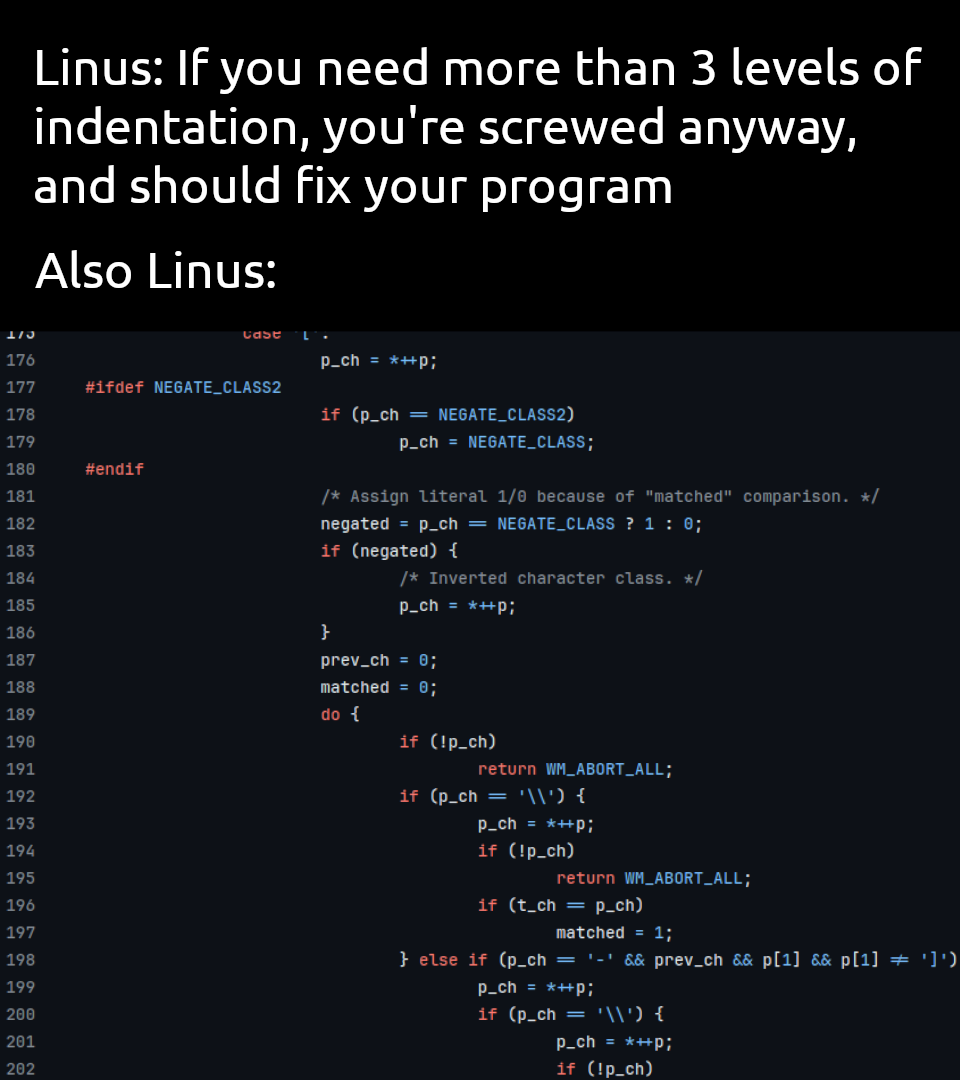this post was submitted on 09 May 2024
458 points (92.4% liked)
Programmer Humor
32479 readers
413 users here now
Post funny things about programming here! (Or just rant about your favourite programming language.)
Rules:
- Posts must be relevant to programming, programmers, or computer science.
- No NSFW content.
- Jokes must be in good taste. No hate speech, bigotry, etc.
founded 5 years ago
MODERATORS
you are viewing a single comment's thread
view the rest of the comments
view the rest of the comments

Maintainability.
You can't read a block of code and as quickly and understand its control flow without reading every line, especially in regards to resource cleanup.
For example say you have:
Say you aren't exactly interested in what happens inside each branch. If you can assume that there's one return at the end of the block, you can see the
ifandelse, you can reason about what values would trigger each branch, you can also see that no matter which branch is executed, the cleanup step will be executed before returning. Straightforward. I don't have to read all the lines of the branches to ensure the cleanup will be executed. If I can't assume a single return, I have to read all those lines too to ensure none of them jumps out of the function skipping the cleanup. Not having to think about such cases reduces the amount of reading needed and it makes reasoning about the block simpler. The bigger the blocks, the more the branches, the stronger the effect. You have one less foot-shotgun to think about. The easier you make it for your brain, the fewer mistakes it's gonna make. For all those days when you haven't slept enough.E: Oh also refactoring blocks of code out into functions is trivial when you don't have multiple returns. Extracting a block with a return in it breaks the parent control flow and requires changes in the implementation.
E2: Shorter blocks do not obviate this argument. They just make things less bad. But they make almost everything less bad. Shorter blocks and single returns make things even better.
If your function is so long that keeping track of returns becomes burdensome, the function is too long.
I'm not a fan of returning status codes, but that's a pretty clear example of early return validation where you can't just replace it with a single condition check. Having a return value that you set in various places and then return at the end is worse than early return.
I don't think it's worse, I think it's equivalent. Also I don't like the risk of resource leaks which is inherent to multi-returns beyond input validation. And that's true beyond C because memory isn't the only resource that can be leaked.
It's not about how readable the branches are, it's about having to read all of them to ensure you understand the control flow so that you don't leak. Length of functions is a red herring. You want me to read the contents of short blocks to ensure the control flow is correct. I don't want to read the contents of those blocks, other than the conditional and loop statements. Reading short blocks is better than reading long blocks. Reading just the control flow lines is better than reading short blocks.
And I'm going to make you read those blocks because they are there for a damn reason. What are you even reading at this point if you're not reading the preconditions? That's how you end up dereferencing null pointers, when you have ten nested ifs you can barely see it on your screen